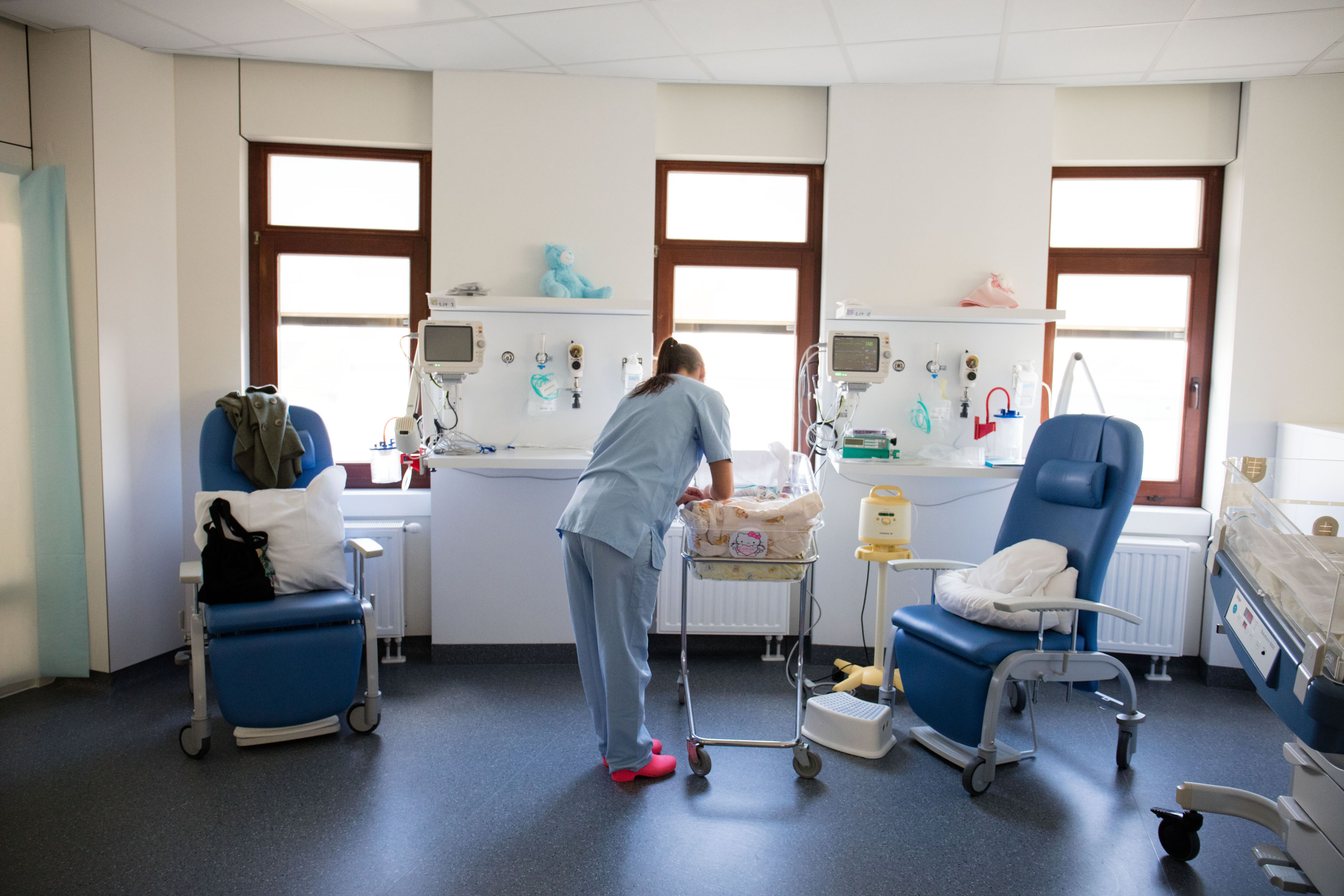The stay Neonatology

HOW IS THE ARRIVAL OF MY BABY IN THE NEONATAL WARD ORGANISED?
Upon his arrival in our unit, your child will be placed on a warming table in order to ensure better monitoring and more ready access as well as to maintain his temperature through thermoregulation.
In our unit, all the children are monitored by a device. This device enables us to monitor heart rate and respiratory rate by means of three electrodes placed on the chest, as well as oxygen saturation by means of a sensor placed on your child's foot or hand. It also enables us to take the blood pressure using an armband.
The monitoring device is connected to a central station located in the nurses' office. Therefore, your child is being monitored 24/7.
The equipment surrounding your baby may be intimidating but it will help us to care for him by optimally monitoring him.
CAN I PARTICIPATE IN CARING FOR MY BABY?
We encourage you to participate as much as possible in caring for your baby in order to get to know him and reinforce the bond between you, depending on the state of his health.
In order to guarantee optimal organisation, we request that you inform us of when you will be present during the day and notify the care team responsible for your child.
WHAT DOES FEEDING A PREMATURE BABY INVOLVE?
A very important step for your baby is acquiring autonomy when it comes to feeding. In order to be discharged, he must be able to easily drink from the breast and/or bottle and therefore be capable of feeding himself sufficiently in order to gain weight and grow. Depending on their degree of prematurity, babies are more or less ready to acquire this skill. It is for this reason that we explain the various stages and possibilities in your baby's development to you, taking into account your plans and his abilities.
It should be noted that babies, even premature ones, often nurse very well but their ability to latch on effectively and coordinate swallowing and breathing gradually develops only from the 34th week of gestation.
Prior to this, they will need to be fed via infusion, if they do not digest well, or by feeding tube. They will gradually begin to drink small quantities from the breast, syringe or bottle.
For premature babies, learning to feed themselves depends on the maturing process, which may be long and each stage of it must be followed.
If breastfeeding cannot be started quickly after delivery, the care team will teach you to express your milk and store it.
Breast milk will always be fed to your child as a priority, regardless of the feeding method employed.
AND HOW WILL THE BABY BE FED GOING FORWARD?
You had chosen a feeding method (breast or bottle) before the birth. Your choice will be respected and supported, except where there are medical contraindications relating to the state of your baby's health or, sometimes, that of the mother. These contraindications to breastfeeding, often transient, will be explained to you and all efforts will be made to facilitate the speedy resumption of breastfeeding.
WHAT MEASURES ARE YOU PUTTING IN PLACE TO ENSURE THAT MY PREMATURE BABY CONTINUES HIS DEVELOPMENT UNDER THE BEST CONDITIONS?
The nurse, midwife and paediatrician are personally and professionally committed to providing tailored care arising from a profound respect and human warmth in which the baby and his parents are active partners. They recognise the importance of creating an environment which allows the baby to develop, learn and adapt according to his own potential.
To this end, we have adopted a series of environmental and behavioural measures such as:
- The establishment of a calm, relaxing environment, exempt from all over-stimulation (light, noise, etc.);
- The preference systematically given to the physiological and comfortable positioning of the premature baby (swaddling, curled sleeping position, etc.);
- Respecting the baby's rhythm and his need for numerous hours of sleep which will help him to grow and recover from the stimulations and the treatments;
- Respecting his feeding rhythm based on his abilities and needs;
- Supporting behaviours that foster well-being: skin-to-skin contact (kangaroo method), massage, non-feeding suckling, etc.;
- The parents' participation in delivering care to support their child (presence and gradual independence in delivering care).
Don't hesitate to bring a small object or a piece of clothing with your odour in order to reassure your child.
HOW LONG WILL MY BABY STAY IN THE NEONATAL WARD?
How long your baby stays in the neonatal unit depends on several factors: his degree of prematurity, but especially his state of health and progress. The paediatrician will inform you about the progress of your child on a regular basis and notify you as soon as possible about a probable date for your baby's discharge. The latter will be confirmed on the day before the discharge at the latest.
On that day, you will receive his health card and a summary detailing your child's appointments and treatment.
For any questions after your discharge, you can always contact us at the neonatal ward or the paediatrics secretariat.

